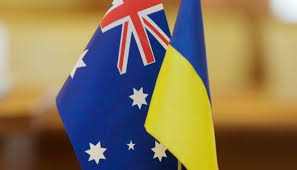
Deputy Prime Minister – Minister of Defense of Australia Richard Marles announced another package of military aid to Ukraine from Australia in 100 million dollars.
“Australia will stay with Ukraine for as long as it takes for Ukraine to win this war. To that end, we are today announcing the next $100 million dollar aid package to Ukraine. 50 million of this will be for short-range air defense systems. Another 30 million will be for drones, as Australia is part of a drone coalition with the UK and Latvia. The remainder of the amount will be used to purchase support equipment, from inflatable boats to helmets and boots,” Marles told a joint briefing with Ukrainian Prime Minister Denis Shmygal in Lviv on Saturday.
He also added that Australia had been able to provide Ukraine with air-to-ground munitions.
“We understand that this conflict will be very long and we will provide more in the future because we are determined to stand with Ukraine for as long as necessary,” the minister stressed.
As Shmygal wrote in Telegram, in total, Australia’s support for Ukraine already amounts to more than $655 million, of which $540 million is specifically military aid.
“We very much appreciate such solidarity of the Australian people with Ukraine. Thank you Mr. Richard Marles for deep involvement in Ukrainian affairs, for effective solidarity, for the concrete things that Australia is doing for Ukraine,” wrote Shmygal.
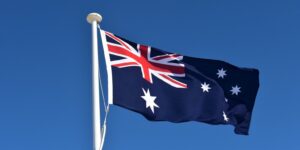
The Australian government is allocating $AU 50 million ($32.4 million) for military assistance to Ukraine, the money will be transferred to the International Fund and used to purchase military equipment for the Ukrainian Armed Forces, Ambassador Extraordinary and Plenipotentiary of Ukraine to Australia Vasyl Miroshnychenko said.
“There is good news from Australia. The Australian government is transferring 50 million Australian dollars (32.4 million US dollars) as military aid to Ukraine. The funds will be transferred to the International Fund for Ukraine (UK) for the further purchase of weapons and equipment for the needs of the Armed Forces of Ukraine,” Miroshnichenko wrote on his Facebook page on Thursday.
According to a report published on the Australian government’s website, Australia’s total support for Ukraine will amount to about $960 million, including $780 million to help the Armed Forces.
“Australia remains committed to supporting Ukraine and the Ukrainians who defend their people, their territory and their sovereignty. The contribution announced today will bring Australia’s total support to Ukraine to approximately $960 million, including $780 million in assistance to the Ukrainian armed forces,” the press release said.

The Australian government has allocated $AU 20 million for a military aid package for Ukraine, Australian Prime Minister Anthony Albanese said during his visit to Washington, Ambassador Extraordinary and Plenipotentiary of Ukraine to Australia Vasyl Miroshnychenko said on his Facebook page on Wednesday.
“20 million Australian dollars (USD 12.7 million – IF-U) will be used to purchase new products from the Australian military-industrial complex, including anti-submarine weapons (Droneshield), mine-clearing equipment (Minelab), mobile X-ray machines (Micro-X) and industrial 3D printers (SPEE3D),” he wrote.
The ambassador also announced that the Royal Australian Air Force E-7A Wedgetail reconnaissance aircraft has arrived at the Ramstein base and will begin its work in the airspace of Eastern Europe.
Vasyl Miroshnychenko thanked Prime Minister Anthony Albanese, Defense Minister Richard Marles and Minister of Defense Pat Conroy for their support of Ukraine.
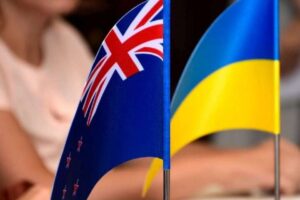
Australian Prime Minister Anthony Albanese announced another package of military support to Ukraine worth 110 million Australian dollars (about $74 million), local media reported.
The new package will include 70 pieces of equipment, including 28 M113 armored vehicles, 14 special-purpose vehicles, 28 MAN 40M medium trucks and 14 trailers.
Kiev will also receive a significant supply of 105mm artillery shells.
In addition, Canberra will provide 10 million Australian dollars to the United Nations to meet Ukraine’s humanitarian needs.
The prime minister stressed that Australia would support Ukraine for as long as necessary.
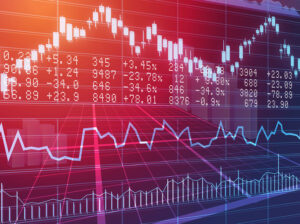
Traders are awaiting the release of data from the U.S. Labor Department on the country’s consumer price movements last month, which are considered key to the Federal Reserve’s (Fed) decision on the future direction of monetary policy.
“All markets are clearly focused on the extremely important U.S. inflation data,” notes SPI Asset Management managing partner Stephen Innes, quoted by Market Watch. – Traders are trying to figure out whether the Fed will change course after this data and what the implications for the U.S. economy will be.”
Experts polled by Trading Economics on average expect U.S. inflation in March slowed to 5.2% on an annualized basis from 6% in February.
Higher-than-expected inflation would raise the likelihood of another Fed rate hike by at least another 25 basis points. The U.S. central bank rate hike has already slowed inflation, but it is also holding back the economy. A further rate hike would increase the threat of recession, which would have a negative impact on stock markets, notes Market Watch.
Japan’s Nikkei 225 stock index gained 0.6% in trading.
SoftBank Group shares gained 1.4 percent, Nippon Yusen rose 2.4 percent, Mitsubishi Corp. – by 2.3%, Nippon Steel by 1.8% and Nintendo by 1%.
Bank of Japan data released Wednesday showed the country’s producer price growth slowed to an annualized 7.2% in March from February’s 8.3%. The rate of increase in producer prices last month was the slowest since September 2021.
China’s Shanghai Composite stock index added 0.3 percent in trading, while Hong Kong’s Hang Seng lost 0.8 percent.
The leaders in mainland China are commodities stocks – Petrochina Co. (SPB: 857) gained 3.4 percent, China Petroleum & Chemical Corp. (Sinopec) gained 1.7 percent and Zijin Mining Group Co. – by 0.7%.
Shares of technology giants are becoming cheaper in Hong Kong. Alibaba Group Holding (SPB: BABA) was down 2.4%. On Tuesday, the company unveiled its own artificial intelligence model, a ChatGPT counterpart that works with Chinese and English. The model will be integrated into all business applications in Alibaba’s ecosystem in the near future, the company said.
According to Bloomberg, Chinese authorities are planning to introduce the requirement of safety checks of technologies similar to the popular chatbot ChatGPT.
Shares of Tencent (SPB: 700) Holdings Ltd. fell 4.4% in trading and JD.Com Inc. (SPB: JD) fell 3.4%.
South Korea’s KOSPI stock index is stable in the course of trading, the Australian S&P/ASX 200 added 0.4%.
BHP Group shares rose 2.1%, Rio Tinto – 2.5%, Fortescue Metals – 1.5%.
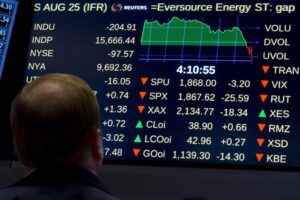
Asia-Pacific stock indices rebounded positively on Monday after the U.S. stock market rallied at the end of last week.
Australian and Hong Kong stock exchanges as well as U.S. and most European countries are closed because of the Christmas holiday.
The Bank of Japan is not going to abandon its ultra-soft monetary policy any time soon, Central Bank Governor Haruhiko Kuroda said.
Last week, the Japanese central bank unexpectedly widened the range within which the yield on ten-year government bonds can fluctuate to plus/minus 0.5% per annum from plus/minus 0.25% previously. Investors took that as a signal that the Bank of Japan was preparing to abandon the ultra-soft monetary policy that it had been pursuing for years.
But Kuroda on Monday rebutted that view, saying that the corridor widening was aimed at boosting the effect of monetary policy and was not the first step in abandoning a major stimulus program. He also noted that the country’s consumer inflation rate could slow below the Bank of Japan’s 2% target in the next fiscal year, which begins in March 2023.
The value of Japan’s Nikkei 225 index rose by 0.65% in trading.
Shares of electronic components maker Sharp Corp. (+3.6%) and commodity companies including JGC Holdings Corp. (+3.5%), Inpex Corp. (+2.5%) and Nippon Steel Corp. (+2.3%) were among the leaders.
In addition, chip maker Advantest Corp. (+1.2%), clothing retailer Fast Retailing (+2%), consumer electronics maker Sony Group (+0.3%), automakers Nissan Motor (+1.9%) and Toyota Motor (+0.3%) went up.
Mitsubishi Electric Corp. and Mitsubishi Heavy Industries Ltd. announced Monday that they intend to merge their generator businesses to become more competitive in the market. The companies plan to sign a definitive agreement at the end of May 2023 and complete the merger of the units by April 1, 2024. Mitsubishi Electric is expected to become the majority shareholder of the new merged company, while Mitsubishi Heavy Industries will become a minority shareholder.
Mitsubishi Electric’s share price rose 1.3 percent and Mitsubishi Heavy Industries rose 2.7 percent.
China’s Shanghai Composite index gained 0.65% over the day.
Technology and consumer companies, including Huizhou China Eagle, up 1.5%; Shenzhen Infinova, Zhejiang Netsun and Xi’an Catering, up about 10%; and automaker BYD, up 4.1%.
The People’s Bank of China on Monday provided banks with 216 billion yuan ($30.9 billion) in reverse repurchase transactions to ensure sufficient liquidity in the financial system at the end of the year. Last week the net inflow of funds into the country’s financial system amounted to 704 billion yuan, the highest weekly infusion since October.
The value of the South Korean Kospi index increased by 0.15%.
Stocks of one of the world’s largest chip and electronics maker Samsung Electronics Co. fell 0.3% and automaker Hyundai Motor rose 0.6%.
A strong rise in quotations showed securities of pharmaceutical companies Kyongbo Pharmaceutical and Samil Pharmaceutical – by 16.3% and 4.5%, respectively.